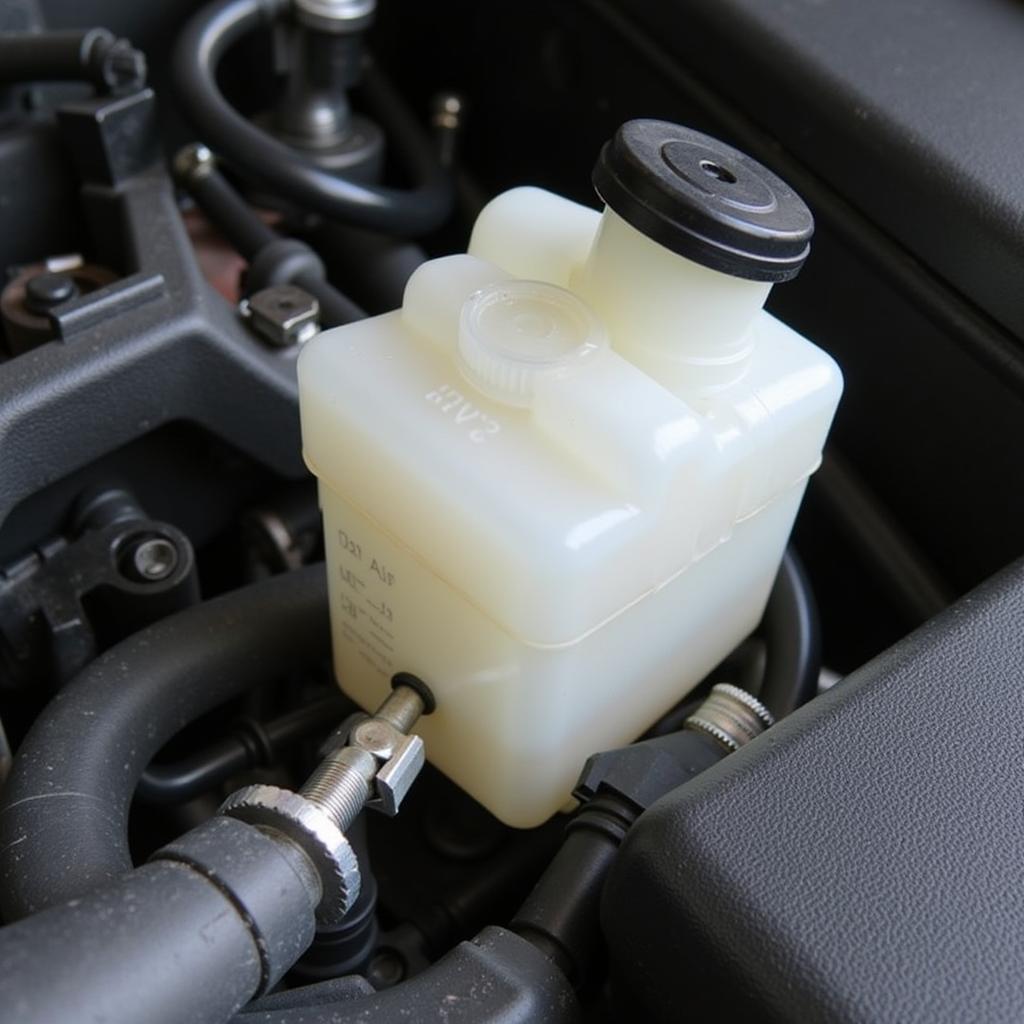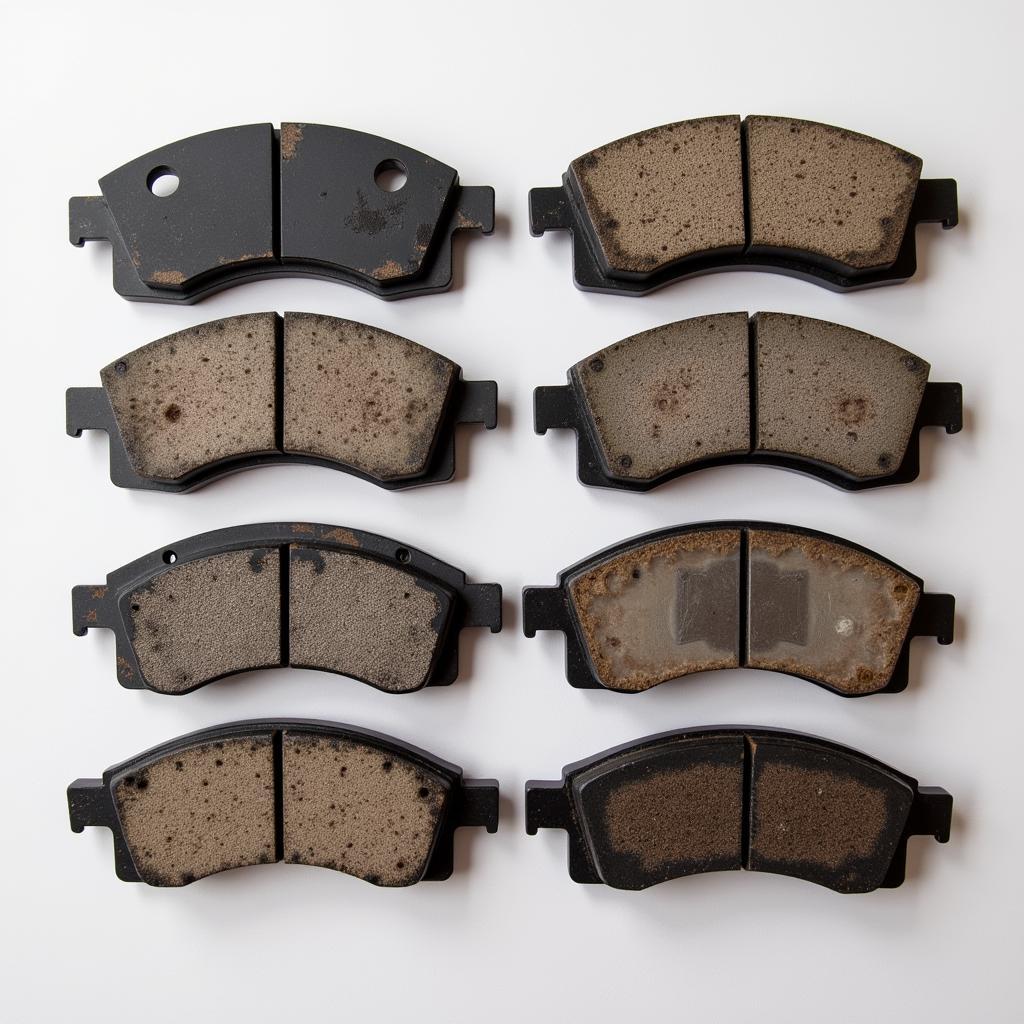The brake fluid warning light on your Peugeot 307 is a crucial safety indicator that should never be ignored. It signals a potential problem with your braking system, which could lead to reduced braking performance or even complete brake failure. This comprehensive guide will walk you through understanding what triggers this warning light, the potential causes, and the steps you can take to diagnose and resolve the issue.
Understanding Your Peugeot 307’s Brake Fluid Warning Light
The brake fluid warning light is typically a red circle with an exclamation mark (!) in the center, often accompanied by the word “BRAKE” on the dashboard. When this light illuminates, it signifies one of two things:
- Low brake fluid level: Your brake fluid reservoir may be low, often due to a leak or worn brake pads.
- Brake system malfunction: There might be a fault within the hydraulic system, such as a faulty brake line or a problem with the ABS (Anti-lock Braking System) module.
Why is My Peugeot 307 Brake Fluid Warning Light On?
Here are some common culprits behind the illumination of your Peugeot 307 brake fluid warning light:
-
Worn Brake Pads: As brake pads wear down, the brake calipers need more fluid to engage the pads with the rotors. This can lead to a lower fluid level in the reservoir.
-
Brake Fluid Leak: A leak anywhere in the brake system, from the master cylinder to the brake lines and calipers, can lead to a drop in brake fluid level and trigger the warning light.
-
Faulty Brake Master Cylinder: The master cylinder is responsible for pressurizing the brake fluid. If it malfunctions, it can lead to inconsistent braking pressure or even complete brake failure.
-
Air in the Brake Lines: Air bubbles in the brake lines can compress, resulting in a spongy brake pedal feel and reduced braking effectiveness. This can also trigger the warning light.
-
Faulty ABS Module: A malfunctioning ABS module can disrupt the hydraulic pressure within the braking system, potentially triggering the warning light.
 Peugeot 307 Brake Fluid Reservoir
Peugeot 307 Brake Fluid Reservoir
What to Do When the Brake Fluid Warning Light Comes On
Safety First: If the brake fluid warning light illuminates while driving, pull over to a safe location immediately. Driving with a compromised braking system is extremely dangerous.
Check the Brake Fluid Level: With the engine off, locate the brake fluid reservoir under the hood. It’s usually a translucent plastic container with a black cap. Check the fluid level against the “MIN” and “MAX” markings.
Do Not Drive if the Fluid is Low: If the brake fluid level is below the “MIN” mark, do not attempt to drive the vehicle. Call a qualified mechanic or tow service to diagnose and repair the issue.
Visual Inspection: Carefully inspect the area around the master cylinder, brake lines, and calipers for any signs of leaks, such as wet spots or drips.
Diagnosing and Fixing the Problem
Professional Diagnosis: While checking the brake fluid level is a good first step, it’s crucial to have a qualified mechanic diagnose the root cause of the problem, especially if you suspect a leak or a more complex issue.
Common Repairs:
-
Brake Pad Replacement: If your brake pads are worn, they’ll need to be replaced. This is a standard maintenance item.
-
Brake Fluid Leak Repair: Identifying and repairing the source of a brake fluid leak is essential. This may involve replacing brake lines, hoses, or seals.
-
Brake Fluid Flush: Over time, brake fluid can absorb moisture and become less effective. A brake fluid flush replaces the old fluid with fresh fluid, restoring optimal braking performance.
-
Master Cylinder Repair or Replacement: If the master cylinder is faulty, it will need to be repaired or replaced.
-
ABS Module Diagnosis and Repair: A qualified mechanic can diagnose and repair or replace a faulty ABS module.
“Ignoring a brake fluid warning light is like playing Russian roulette with your safety,” says John Smith, a seasoned automotive engineer with over 20 years of experience. “Even a small leak can escalate quickly, leading to a catastrophic brake failure. Always err on the side of caution and seek professional help.”
Preventing Future Brake Fluid Warning Light Issues
- Regular Brake Inspections: Have your brakes inspected by a qualified mechanic at least once a year or as recommended in your Peugeot 307 owner’s manual.
- Timely Brake Pad Replacement: Don’t wait for the brake pads to wear down completely. Replace them as soon as they reach the recommended wear limit.
- Quality Brake Fluid: Use high-quality brake fluid that meets the specifications outlined in your owner’s manual.
- Be Mindful of Warning Signs: Pay attention to any changes in brake pedal feel, unusual noises while braking, or a “peugeot 307 brake fluid warning” message on your dashboard. peugeot 307 brake fluid warning
Conclusion
The brake fluid warning light on your Peugeot 307 is a serious safety concern. Never ignore it. Promptly address any issues to ensure the safety of yourself, your passengers, and other road users. Regular maintenance and timely repairs are key to preventing brake system problems and enjoying a safe driving experience.
FAQs:
1. Can I add brake fluid myself if the level is low?
While you can temporarily top off the brake fluid, it’s crucial to determine the cause of the low level. Adding fluid without addressing the root cause can be dangerous.
2. How often should I change my brake fluid?
It’s generally recommended to flush and replace your brake fluid every 2 years or 24,000 miles. Consult your owner’s manual for specific recommendations for your Peugeot 307.
3. What type of brake fluid does my Peugeot 307 use?
Refer to your owner’s manual or the brake fluid reservoir cap for the specific type of brake fluid recommended for your Peugeot 307.
4. Can worn brake pads trigger the brake fluid warning light?
Yes, as brake pads wear down, the calipers require more fluid, potentially lowering the fluid level in the reservoir and triggering the warning light.
5. Is it safe to drive with the brake fluid warning light on?
No, it is highly unsafe to drive with the brake fluid warning light illuminated. Doing so puts you at risk of brake failure.

